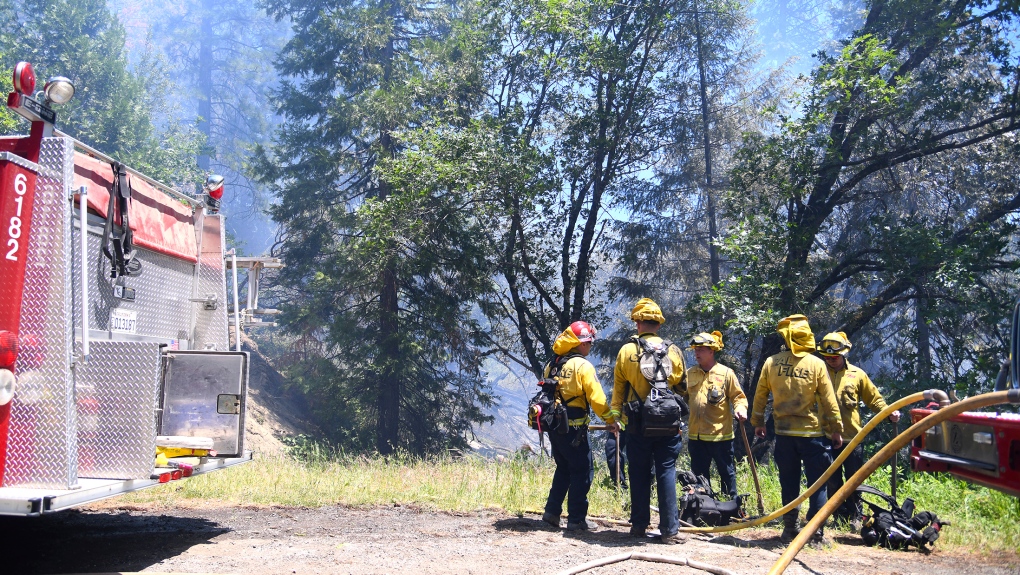SACRAMENTO, Calif. -
California Gov. Gavin Newsom threatened Monday to impose mandatory water restrictions if residents don't use less on their own as a drought drags on and the hotter summer months approach.
Newsom raised that possibility in a meeting with representatives from major water agencies, including those that supply Los Angeles, San Diego and the San Francisco Bay Area. The Democratic governor has avoided issuing sweeping, mandatory cuts in water use and instead favored giving local water agencies power to set rules for water use in the cities and towns they supply.
January through March typically is when most of California's annual rain and snow falls, but this year those months were the driest in at least a century. Despite calls for conservation, the state's water use went up dramatically in March -- 19% compared to the same month in 2020 -- and now Newsom is considering changing his approach.
"Every water agency across the state needs to take more aggressive actions to communicate about the drought emergency and implement conservation measures," Newsom said in a statement.
California is in its third year of drought and virtually all areas of the state are classified as either in severe or extreme drought. Due to low water levels in state reservoirs, the state is releasing only a limited amount of water from its supplies.
Newsom last summer called on Californians to voluntarily reduce their water use by 15% by doing things like taking five-minute showers and avoiding baths, only running the washing machine and dishwasher with full loads and limiting water use for cleaning outdoor areas. Water used for farming isn't counted.
Several local water officials present in the meeting said the tone was positive and focused on how all of the agencies can work together to promote conservation.
"From our perspective it works best when local water managers deal with local water supply conditions, but we're trying to support the state, we're trying to support the governor as best we can," said Ed Stevenson, general manager for the Alameda County Water District, who was in the meeting.
The district gets about 40% of its water from state supplies. It's water use is down about 7% since Newsom called for voluntary conservation.
San Diego County Water Authority, meanwhile, hasn't needed any water from state supplies since July partly because it relies on a mix of other sources including a desalination plant, said board Chairman Gary Croucher. But he said the district still has a role to play in responding to the drought. The authority is made up of 24 water agencies including the city of San Diego, where water use is down 1.3% since Newsom called for savings.
"If anybody wants to say that we're independent and we're okay just by ourselves, they're fooling themselves. We really need to work together as a group of collaborators," he said.
How soon Newsom could impose mandatory restrictions if conservation doesn't improve wasn't clear. Spokesperson Erin Mellon said the administration would reassess conservation progress in just "a few weeks." She didn't offer a metric the administration would use to measure success.
Newsom has already moved to force more conservation from local water districts. The water board will vote Tuesday whether to ban watering of decorative grass and to force local agencies to boost conservation efforts.
After the last drought, the state started requiring cities and other water districts to submit drought response plans that detail six levels of conservation based on how much water is available. Newsom has asked the board to require those districts move into "Level 2" of their plans, which assumes a 20% water shortage.
Each district can set its own rules for "Level 2," and they often include things like further limiting water use for outdoor purposes and paying people to install more efficient appliances or landscaping that needs less water. They must include a communication plan to urge conservation.
If approved those restrictions would take effect June 10. Water agencies that don't comply could be fined $500 per day, as could businesses or other institutions that continue to water ornamental grass, said Edward Ortiz, a spokesman for the water board.
Last week while touring a water recycling plant in Los Angeles County, Newsom spoke about better communicating the need for water conservation with the state's 39 million people. He's included $100 million in his budget for drought messaging.
During the last drought, in 2015 former Gov. Jerry Brown issued a mandatory 25% cut in the state's overall water use, and the state water board set requirements for how much each water district had to cut based on their existing water use; districts with higher water use were asked to cut more. Water agencies could be fined up to $10,000 per day if they didn't comply.
The state water board has imposed some statewide restrictions such as banning people from watering their lawns for 48 hours after rainstorms and sprinklers from running onto sidewalks. People can be fined $500 per day for violations.
Broadly, the state needs to be thinking about how to set California up to better deal with drought, said Dr. Newsha Ajami, a water expert at the Lawrence Berkeley National Laboratory who studied conservation messaging during the last drought.
"We need to have a long-term strategy for how we are going to deal with these more frequent hotter, drier droughts that we are experiencing and actually do things when we are not in the drought," she said.
Attendees at the meeting included representatives from the Los Angeles Department of Water and Power, East Bay Municipal Utility District, the Metropolitan Water District of Southern California, Alameda County Water District, the San Francisco Public Utilities Commission, Valley Water, the San Diego County Water Authority, the Association of California Water Agencies, California Urban Water Agencies and the California Municipal Utilities Association. The meeting was not open to the press or public.





































